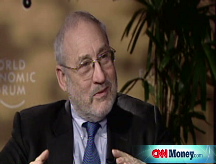Davos divided on how to fix Wall Street
Bankers and regulators couldn't agree on whether regulation is needed to fix Wall Street and the world's financial markets.
DAVOS, Switzerland (Fortune) -- One of the more repeated comments heard in the after hours chatter in the salons of Davos was that no one from the financial industry has actually apologized for the mess they've created in the global financial system.
It is true that many of Wall Street's whipping-boys decided not to attend this year's World Economic Forum. Merrill's John Thain and Barclay president Robert Diamond, Jr. didn't show up for a session titled "Scenarios for the Future of the Global Financial System." Those bankers who did make an appearance argued we shouldn't play the blame game. As one put it with some bitterness: "What we call greed now, we called success a year ago."
While not disposed to apologize openly, many financial titans were perfectly willing to air their ideas to fix Wall Street. In the session, Dan Och, CEO of Och-Ziff Capital Management, one of the few hedge fund managers to attend Davos, commented with not a little understatement that there's been "lots of disappointment in the industry." He believes, however, that "those hedge funds that before the crisis did risk management, practiced transparency and had strong institutional relationships will prosper." His implied message to the Obama administration: just leave us alone.
Not everyone on the panel possessed such a laisse-faire attitude. Jean-Claude Trichet, president of the European Central Bank, argued that we need a global financial regulatory system, the details of which were too mind-boggling to explain in a panel discussion, but did involve heavy regulation of the derivatives market.
Tony Tan Keng-Yam, the Executive Director of GIC, Singapore's sovereign wealth fund, said that in the future the financial world will be divided into two types of institutions. On one side will be big commercial banks with tight regulations, low leverage and government guarantees. On the other will be hedge funds and private equity firms - smaller businesses with higher leverage and less regulation. One key to making such a system work would be to attract top talent to police Wall Street. Keng-Yam suggested following Singapore's lead by paying U.S. regulators salaries competitive with the private sector.
Just as it seemed that the pro-red tape crowd was gaining the upper hand, Henry Kravis, co-founder of the private equity firm Kohlberg, Kravis, Roberts, came in swinging for the free market, saying the U.S. regulators were already plenty talented. (How he would explain the SEC's failure to act against Bernie Madoff after getting tipped off remains to be seen.)
Kravis said what's really needed to fix Wall Street is to get rid of 'short-termism." The key is the compensation system. Wall Street executives currently get paid based on how their business performed in a single year, he explained. Instead, bonus pay should be determined by how well their decisions turn out four or five years down the road. Kravis: "We need to align the interest of shareholders and all interested parties - employees, NGOs, environmentalists and suppliers."
Just the day before President Obama lashed out at Wall Street executives calling their $18.4 billion in 2008 bonuses "shameful." Maybe Mr. Kravis was listening. ![]()
-
 The retail giant tops the Fortune 500 for the second year in a row. Who else made the list? More
The retail giant tops the Fortune 500 for the second year in a row. Who else made the list? More -
 This group of companies is all about social networking to connect with their customers. More
This group of companies is all about social networking to connect with their customers. More -
 The fight over the cholesterol medication is keeping a generic version from hitting the market. More
The fight over the cholesterol medication is keeping a generic version from hitting the market. More -
 Bin Laden may be dead, but the terrorist group he led doesn't need his money. More
Bin Laden may be dead, but the terrorist group he led doesn't need his money. More -
 U.S. real estate might be a mess, but in other parts of the world, home prices are jumping. More
U.S. real estate might be a mess, but in other parts of the world, home prices are jumping. More -
 Libya's output is a fraction of global production, but it's crucial to the nation's economy. More
Libya's output is a fraction of global production, but it's crucial to the nation's economy. More -
 Once rates start to rise, things could get ugly fast for our neighbors to the north. More
Once rates start to rise, things could get ugly fast for our neighbors to the north. More








